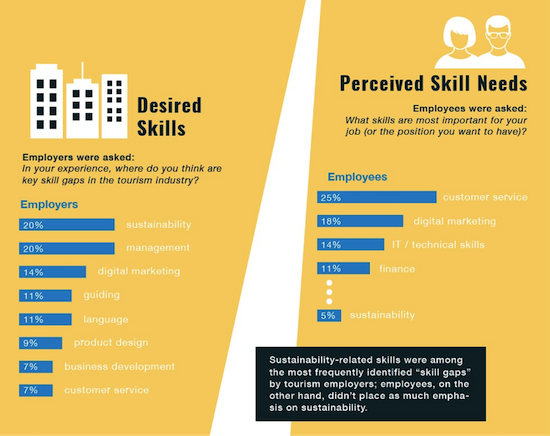« The skills and talents of tourism professionals are a critical part of ensuring a sustainable future for the travel and tourism industry and its role in supporting the global sustainable development goals. »
The GSTC Sustainable Tourism Training Program (STTP) has contributed to the September / October 2017 edition of Pacific Asia Travel Association (PATA) Connected Visitor Economy Bulletin, an e-publication covering industry trends and developments in order to monitor tourism’s impacts and to encourage more comprehensive policy responses from governments in support of the sector.
This edition, « Boosting Sustainability Skills, Expanding Business Opportunities », examines how tourism destinations and businesses can further develop HCD (human capital development) in sustainable tourism, and why investing in people is a critical part not only of sustainability practices, but also business performance and competitiveness.
The following is an excerpt from the Bulletin. To read the full piece, please download the document from here.
Sustainable Tourism for Development
The United Nations has designated 2017 as the International Year of Sustainable Tourism for Development, with the goal of promoting and raising awareness of the contribution of sustainable tourism to development, in the context of the 2030 Agenda for Sustainable Development [supporting the] Sustainable Development Goals (SDGs). Training and capacity building are specifically relevant to Goals 8, which emphasizes the need to “promote sustained, inclusive and sustainable economic growth, full and productive employment and decent work for all”.
Ultimately, strengthening the quality of the tourism workforce is also about making the industry more resilient, and better equipping destinations and communities with the knowledge and skills necessary to face various risks and threats posed by changes in socioeconomic, environmental and geopolitical conditions.
“When we talk about policies for reducing vulnerability and building resilience, culturally appropriate, environmentally responsible and economically viable tourism can contribute to preventing shocks, promoting capabilities and protecting choices.” – Steve Noakes, Adjunct Professor, Griffith University
Sustainability and Competitiveness
In addition to supporting and contributing to sustainable development goals, HCD – investing in people – in tourism is an integral part of the viability and competitiveness of the sector.
[T]he “Tourism Skills and Jobs” report by TrainingAid (2016), which indicates that many tourism industry employers see sustainability skills as among the most important professional competencies both for staff and management positions, while on the other hand employees often either lack awareness or access to opportunities to build sustainability skills.
Investing in training and capacity building in sustainability-related areas, therefore, is an important consideration for tourism organizations, not just to improve their sustainability practices, but also to stay competitive.
Public-Private Community Partnership
Training and HCD in sustainable tourism is an area ripe for multi-stakeholder collaboration.
For example, tourism destination organizations, government entities and private businesses may work together to effectively invest in professional development and skills building opportunities for those in need (e.g. youth, women, and disadvantaged groups), by engaging with community organizations and NGOs that work with such target groups.
« Designated Areas for Sustainable Tourism Administration (Public Organization) or DASTA in Thailand has been promoting community-based tourism as a critical instrument for sustainable destination development. In addition to financial support, a key aspect of this work is training and capacity building, which is best delivered in close collaboration with the private sector and community members in order to achieve a win-win situation for all involved. » – Panate Manomaivibool, Lecturer, Mae Fah Luang University
More about the STTP
The GSTC Sustainable Tourism Training Program (STTP) offers practical insights and effective steps to help you improve your sustainability practices. With the aim of strengthening awareness of sustainable tourism in destinations around the world, the training program covers global trends in sustainable tourism and sustainability best practices for businesses and destinations. Designed as a intensive and interactive training experience led by expert GSTC Trainers, STTP training classes are offered throughout the year, and provide two options for completing the training requirement towards earning the GSTC Certificate in Sustainable Tourism:
- Onsite 3-day training classes (Face-to-face training classes offered throughout the year in various locations around the world).
- Online 4-week training classes (Online scheduled training classes led by GSTC trainers, available at least 4 times a year).






